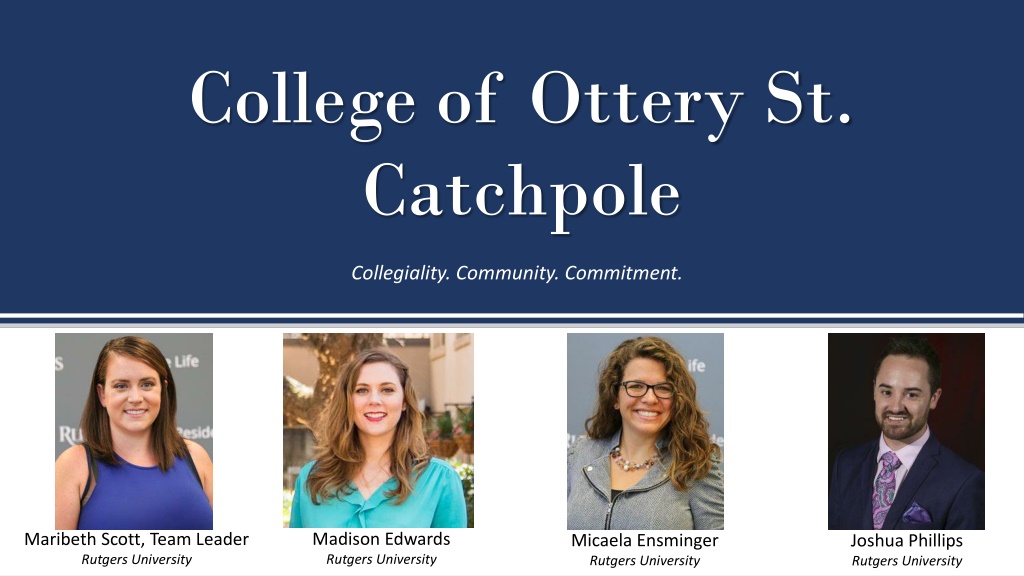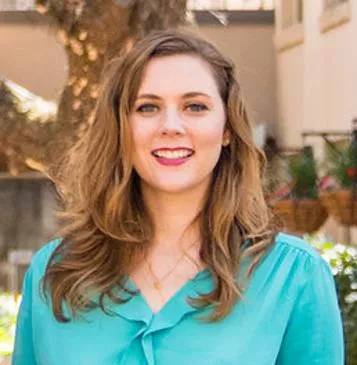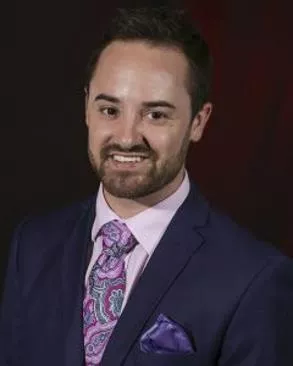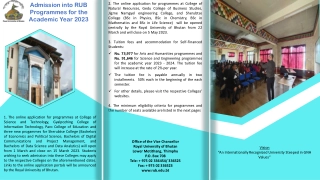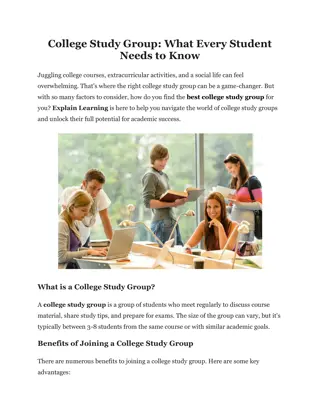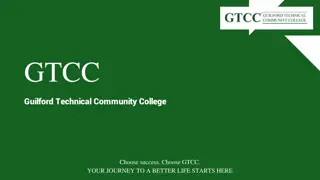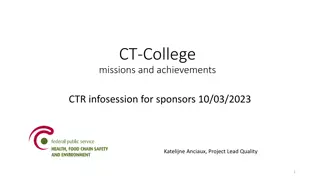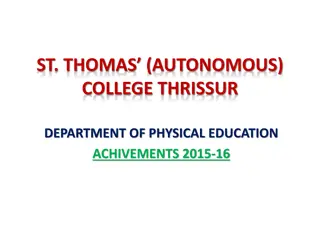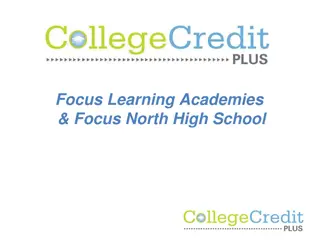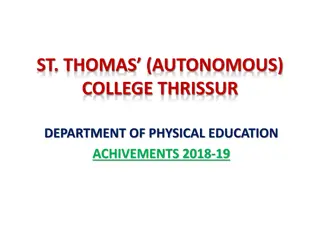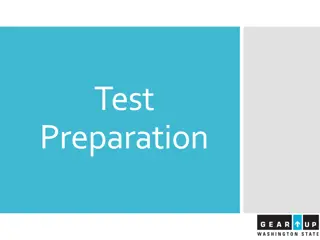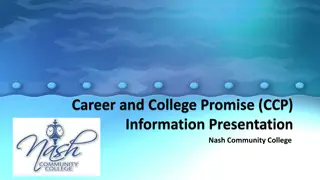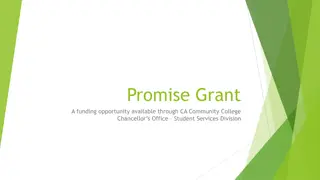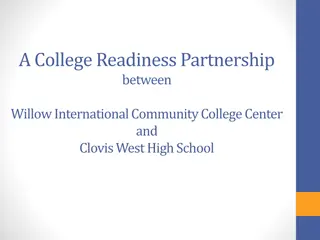College of Ottery St. Catchpole
"Explore the engaging world of College of Ottery St. Catchpole, a mid-size public institution promoting diversity, civic engagement, and critical thinking. Rooted in values of collegiality, community, and commitment, this suburban university in Northern Virginia offers a holistic approach to education. Embrace the traditions and inclusive atmosphere while fostering growth and development in students to become active citizens in a global society."
Uploaded on Feb 26, 2025 | 0 Views
Download Presentation

Please find below an Image/Link to download the presentation.
The content on the website is provided AS IS for your information and personal use only. It may not be sold, licensed, or shared on other websites without obtaining consent from the author. Download presentation by click this link. If you encounter any issues during the download, it is possible that the publisher has removed the file from their server.
E N D
Presentation Transcript
College of Ottery St. Catchpole Collegiality. Community. Commitment. Madison Edwards Rutgers University Maribeth Scott, Team Leader Rutgers University Micaela Ensminger Rutgers University Joshua Phillips Rutgers University
Come gather round people Wherever you roam... COSC Collegiality. Community. Commitment.
College of Ottery St. Catchpole (COSC) The College of Ottery St. Catchpole is (COSC) is a mid- size public institution located in suburban northern Virginia. Primarily White Institution (PWI) 56% White 21% African American/ Black 17% Latinx 5% Asian/ Pacific Islander 1% Native/ Indigenous 7,500 student population Variety of student organization representing both cultural and political diversity Mascot: Ollivander the Otter COSC Collegiality. Community. Commitment.
Mission and Values The College of Ottery St. Catchpole strives to be a haven of high-quality liberal arts education that remains focused on holistic development. Mission: The College of Ottery St. Catchpole provides students opportunities for growth and development in civic engagement, leadership, and critical thinking in order to become active citizens in an increasingly global world. Our school is centered on three foundational principles and values: Collegiality: As fellow citizens and scholars in a democratic society, we build an atmosphere of informed and impassioned inquiry, advocacy, and collegiality free of bias in all aspects of the university experience. Community: As a public institution, we value a diverse, inclusive, and engaged community of students, faculty, staff, and off- campus community members working together for the common good. Commitment: We are committed to respecting the traditions and history of the COSC campus while also upholding the dignity and well-being of all members of the COSC community. COSC Collegiality. Community. Commitment.
Itll soon shake your windows and rattle your walls... COSC Collegiality. Community. Commitment.
Overview of Incident Recognized student organization brought Lucius Umbridge to campus Event was open to all of campus as well as community members Central themes of talk were purity, power, and nationalism Event became violent Students began shouting and eventually began pushing one another Campus police were on-site Dispersed crowd and community members No injuries or arrests Dean of Students office charged with identifying a committee to review guidelines for speakers and events COSC Collegiality. Community. Commitment.
Admit that the waters Around you have grown... COSC Collegiality. Community. Commitment.
Overview of Policies at the Time of the Incident Adapted piecemeal as institution grew over time Primarily reactionary in nature Forms were rarely revised Departments were siloed 3 paper forms for student clubs to submit for approval: 1. General event notification to Campus Activities Board (CAB) 2. Space reservation 3. Campus police (if needed based on expected attendance) Forms required for hosting non-COSC affiliated speakers Lack of accountability or consequence for clubs who do not follow procedure No formal oversight of outdoor space by Space Management Team No vetting process for guest speakers No formal guidelines regarding (im)proper student conduct at CAB-approved events COSC Collegiality. Community. Commitment.
Overview of Current Forms Form 2 (Space Reservation) Submitted to Student Affairs Space Management Team Form 3 (Request for Officers) Submitted to Campus Police Form 1 (General Info) Submitted to CAB Sponsoring Club(s) Date, Time, Duration of Event Nature of Event (Lecture, Rally, Workshop, etc.) Location of Event Open To Public? Y/N Students Only? Y/N Admissions Fee? Y/N Expected Attendees? Number of officers requested? Overtime needed? Y/N Sponsoring Club(s) Speaker s Name Speaker s Contact Info Speaker s Contract and Payment Info Date, Time, Duration of Event Nature of Event (Lecture, Rally, Workshop, etc.) Marketing for Event (digital copy of poster, email, etc.) Sponsoring Club(s) Speaker s Name Date, Time, Duration of Event Nature of Event (Lecture, Rally, Etc.) Expected Number of Attendees Openness of Event (Open to Public, Ticketed Event, Etc.) Campus Police Requested or Required? COSC Collegiality. Community. Commitment.
Campus Police Presence Police presence can be requested at any event Police presence is required if event attendance is anticipated to be 100+ Process: Student club completes Form 3 Chief of Police decides number of officers needed based on projected attendance Cost of police presence: Officially and currently, if 2+ officers are required/requested, the student clubs are responsible for covering the cost of the officers overtime pay at $60/hour In practice, the Division of Student Affairs covers these costs most of the time COSC Collegiality. Community. Commitment.
You better start swimming or You ll sink like a stone COSC Collegiality. Community. Commitment.
Problems Identified 1. Forms are repetitive and not a good use of time and resources 2. No single individual or team has all of the pertinent information regarding events 3. Three different approving/denying parties create a convoluted system: a. No accountability on student clubs to complete form revisions if any party denies b. Creates discrepancies in records among departments regarding events 4. Events and actions of COSC-affiliated speakers and clubs often not accounted for in form submission process 5. No one manages the outdoor spaces on campus 6. Discrepancy between practice and policy as to who pays for campus police presence and overtime COSC Collegiality. Community. Commitment.
Dont stand in the doorway, dont block up the hall For he that gets hurt will be he who has stalled... COSC Collegiality. Community. Commitment.
Timeline: Short-Term Committee Formation Create new Campus Activism Committee Staffing Appointment of CAB advisor (a volunteer staff member who will approve/deny events) Forms Purchase Wufoo access; transfer forms from hard copy to online Meeting Campus Police and senior student affairs leadership Immediate Within 1 month Immediate Immediate COSC Collegiality. Community. Commitment.
Timeline: Long-Term Assessment Small and large scale assessment to examine success of policies and stakeholder satisfaction Education Implement workshops on exploring civil discourse & difficult dialogue Budget Reallocate funds to pay for Campus Police presence at speaker events to CAB Town Hall Bring student voices into policy and procedure changes moving forward Restorative Justice Implement processing circles for future events ~6-8 months Ongoing Ongoing 2 months ~3-6 months COSC Collegiality. Community. Commitment.
Town Hall & Student Involvement Student activism and involvement is developmental, not detrimental (Biddix, Somers, & Polman, 2009) Town Hall Civil Discourse Workshops Campus Activism Committee Invite students to learn about and process potential policies in a brave space Students and administrators collaborate to explore what a culture of civil discourse could look like for this campus Ensure student voices are heard through committee representation of student leaders Bring in advisors and student leaders from student groups (cultural centers, political groups, etc.) to ensure wide representation Put our mission into action: give students a chance to demonstrate civic leadership & democratic engagement (Hamrick, 1998) Educates university stakeholders about laws and rights, while also working to change attitudes and culture COSC Collegiality. Community. Commitment.
Assessment & Evaluation Large Scale: Campus Climate Survey In the Spring 2019 semester, COSC will implement its first campus climate instrument, the Diverse Learning Environments (DLE) Survey Comprehensive Integration Utilize assessment methods to evaluate success of policies, stakeholder satisfaction, and identify possible improvements in all steps Small Scale: Post-Workshop Survey Students and administrators will fill out a short survey to give a snapshot of learning and satisfaction of workshop curriculum and strategies Assessment Cycle Small scale assessments will occur after every workshop and after the town hall; Large scale assessment will occur 1x a year for first two years, then every other year after that COSC Collegiality. Community. Commitment.
Benchmarking: Magic10 Conference Topics for Benchmarking Peers and Aspirational Peers in Magic10 Conference Speaker Policies Protest and Demonstration Policies Reactionary Measures Budgets Models of Partnership Between SA Leaders and Campus Police Assessment Methods Restorative Justice Practices St. Mungo s Medical University Lumos College Weasley & McGonagall University College of King s Cross University of Grimmauld Hogsmeade University Godric s Hollow College The Gringotts School Granger School of Science and Math College of Ottery St. Catchpole COSC Collegiality. Community. Commitment.
Proposed Budget: Overview Small Scale Assessment Materials $100 Campus Climate Survey $3,500 Wufoo $350 Overtime for Campus Police Town Hall Marketing $100 Workshop Marketing $100 $7,500 Grand Total: $11,650 COSC Collegiality. Community. Commitment.
References Biddix, J. P., Somers, P. A., & Polman, J. L. (2009). Protest reconsidered: Identifying democratic and civic engagement learning outcomes. Innovative Higher Education, 34, 133-47. doi:10.1007/s10755-009-9101-8 Dylan, B. (1964). The times they are a-changin . On The times they are a-changin [CD]. New York City: Columbia Records. (1963). Goldblum, A. (2009). Restorative justice from theory to practice. In J.M. Schrage & N.G. Giacomini (Eds.) Reframing Campus Conflict: Student Conduct Practice Through a Social Justice Lens. Virginia: Stylus. Hamrick, F. A. (1998). Democratic citizenship and student activism. Journal of College Student Development, 39(5), 449. Higher Education Research Institute (2017). Fee calculator. Retrieved from https://heri.ucla.edu/fee-calculator/ COSC Collegiality. Community. Commitment.
References (Continued) Hoffman, G. D., & Mitchell, T. D. (2016). Making diversity "Everyone's business": A discourse analysis of institutional responses to student activism for equity and inclusion. Journal of Diversity In Higher Education, 9(3), 277- 289. Harrison, L. M., & Mather, P. C. (2017). Making meaning of student activism: student activist and administrator perspectives. Mid-Western Educational Researcher, 29(2). Jacoby, B. (2017). The New Student Activism: Supporting Students as Agents of Social Change. Journal Of College And Character, 18(1), 1-8. Uecker, T.W. (2011). How Do Campus Administrators Go Beyond the First Amendment in Achieving Balance Between Free Speech and Civil Discourse? In P.M. Magolda and M. B. Baxter-Magolda (Eds.), Contested Issues in Student Affairs: Diverse Perspectives and Respectful Dialogue (pp. 354-364). Sterling, Virginia: Stylus Publishing. Wufoo (2018). Plans & pricing. Retrieved from https://www.wufoo.com/pricing/ COSC Collegiality. Community. Commitment.
